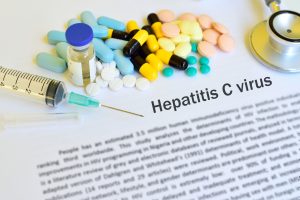 Hepatitis C infection in liver cirrhosis patients can be cured with investigational oral therapy. An advanced form of liver disease, cirrhosis can be caused by hepatitis C infection, alcoholism, autoimmune disease, and other strains of hepatitis, among other causes. Hepatitis C attacks the liver, leading to the formation of scar tissue.
Hepatitis C infection in liver cirrhosis patients can be cured with investigational oral therapy. An advanced form of liver disease, cirrhosis can be caused by hepatitis C infection, alcoholism, autoimmune disease, and other strains of hepatitis, among other causes. Hepatitis C attacks the liver, leading to the formation of scar tissue.
In its early stages, damage caused by hepatitis C to the liver is referred to as fibrosis. As liver damage progresses, the damage becomes irreversible and is known as cirrhosis.
Advertisement
Roughly five to 20 percent of hepatitis C patients will go on to develop cirrhosis of the liver within a 20- to 30-year time span.
Currently, the only treatment for cirrhosis of the liver is a liver transplant.
Hepatitis C treatment may help cure 90 percent cirrhosis patients: Study
A 12-week investigational study of an oral therapy showed promise in curing hepatitis C in patients with cirrhosis of the liver. This investigational oral therapy was well tolerated by patients.
Previously, the only agent that was shown to improve hepatitis C was interferon, but unfortunately patients experienced relapses and unwanted side effects.
The new agent is interferon-free and consists of ABT-450/ritonavir, ombitasvir, dasabuvir, and ribavirin. After 12 weeks of receiving the last dosage, the researchers did not detect any hepatitis C in the blood of 91.8 percent of the patients. Of the patients treated for 24 weeks, 95.9 percent were virus-free 12 weeks after the end of the therapy.
Researcher Fred Poordad said, “These are out-of-the-ballpark response rates, not on the same planet as interferon. The reason this study is so profound is because interferon is not tolerated, nor is it safe in many people with cirrhosis. Many of the patients with cirrhosis in this study were not even eligible to be treated with interferon.”
Outcomes were studied among 380 patients. Dr. Poordad concluded, “Patients with advanced liver disease can now be cured of their hepatitis with a very well-tolerated and short regimen.”
Cirrhosis symptoms due to hepatitis C
 There are two types of cirrhosis of the liver: compensated and decompensated. In compensated cirrhosis, the liver can still function, as cirrhosis is still in its early stages. Patients may still be unaware that they have cirrhosis of the liver. Symptoms resulting from compensated cirrhosis include:
There are two types of cirrhosis of the liver: compensated and decompensated. In compensated cirrhosis, the liver can still function, as cirrhosis is still in its early stages. Patients may still be unaware that they have cirrhosis of the liver. Symptoms resulting from compensated cirrhosis include:
- Appetite loss
- Confusion or difficulty thinking
- Dark, cola-colored urine
- Easy bruising and abnormal bleeding
- Edema in the feet and legs (swelling from fluid buildup)
- Fatigue (feeling tired)
- Impotence, shrinking of the testicles, and breast swelling in men
- Itchy skin (pruritus)
- Jaundice (yellowing in the skin, mucous membranes, or eyes)
- Muscle cramping
- Nausea
- Pale or clay-colored stools
- Redness on the palms of the hands
- Spider veins (small red spidery veins on the skin)
- Weight loss
In decompensated cirrhosis, the liver does not function well and complications may result. Symptoms of decompensated cirrhosis include:
- Ascites, which is bloating from fluid buildup in the abdomen.
- Hepatic encephalopathy (HE), a brain disorder that develops when the liver is unable to remove ammonia and other toxins from the body. HE may cause impaired concentration, sleep disturbances, confusion, or coma.
- Spontaneous bacterial peritonitis, which is associated with ascites, an infection of the membrane covering the abdominal organs.
- Variceal hemorrhage, a severe bleeding from enlarged veins in the esophagus and upper stomach.
Treatment options for hepatitis C and liver cirrhosis
If caught early, cirrhosis is treatable. Typically, in order to best treat cirrhosis, the cause of the condition must be addressed. This can refer to treating hepatitis, cutting alcohol or drug use, or treating a parasite.
Complications linked with cirrhosis also need to be treated. This can involve releasing excess fluid from the body, managing blood pressure, treating cirrhosis-related infections, and taking medications to reduce toxins in the body.
If cirrhosis is severe, a liver transplant is required.
Cirrhosis is not inevitable, and you can take some steps to protect your liver and thus prevent cirrhosis.
Limit or cut out alcohol: Alcohol isn’t just linked with cirrhosis, it can also play an overall role in poor liver function.
Choose a healthy diet to promote liver function: Steer clear of fatty, fried foods and stick with fruits, vegetables, and lean meats. Note that red meat takes longer to break down in the liver.
Maintain a healthy weight: Some forms of liver disease, including cirrhosis, are linked with fat accumulation.
Reduce your risk of developing hepatitis: Do not share needles, ensure you are vaccinated, and be aware of the risk of hepatitis when traveling to foreign countries.
Advertisement
Avoid infections: Cirrhosis makes it difficult to fight off infections. Avoid people who are sick and wash your hands frequently.
Eat a low-sodium diet: High sodium can cause your body to retain fluids, worsening swelling in your abdomen and legs. Use herbs for seasoning your food, rather than salt. Choose prepared foods that are low in sodium.
Hepatitis C treatment depends on the extent of the liver damage, other co-existing health conditions, the amount of virus circulating in the body, and the type of hepatitis C. There are medications available for hepatitis C, but these can yield unwanted side effects. Combinations of antiviral medications offer the greatest success. Working with your doctor can help you choose the best mode of treatment.
